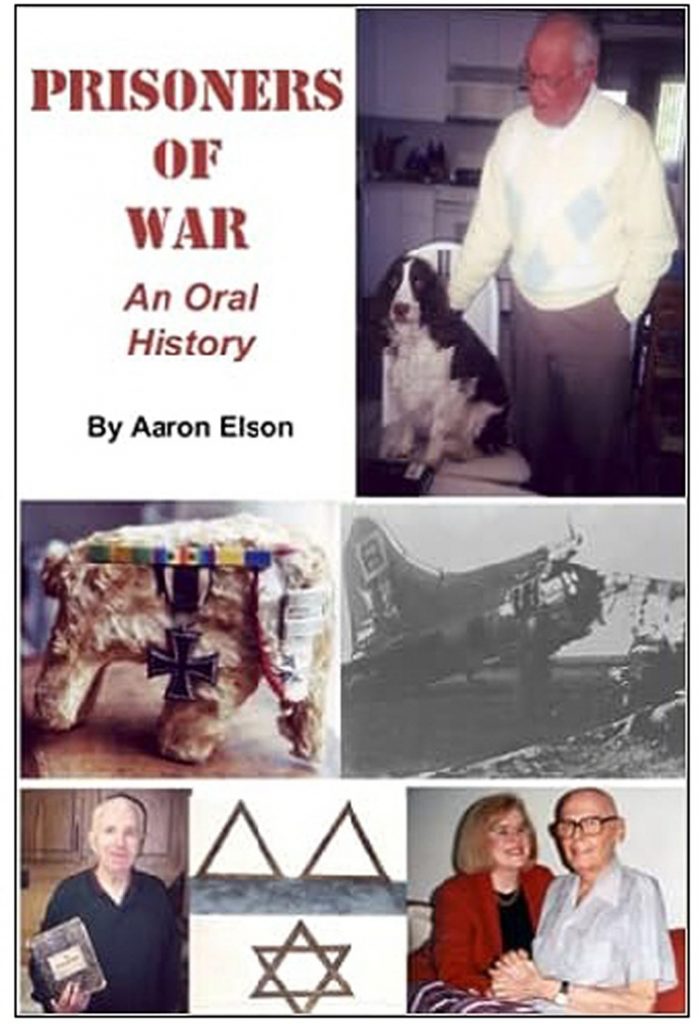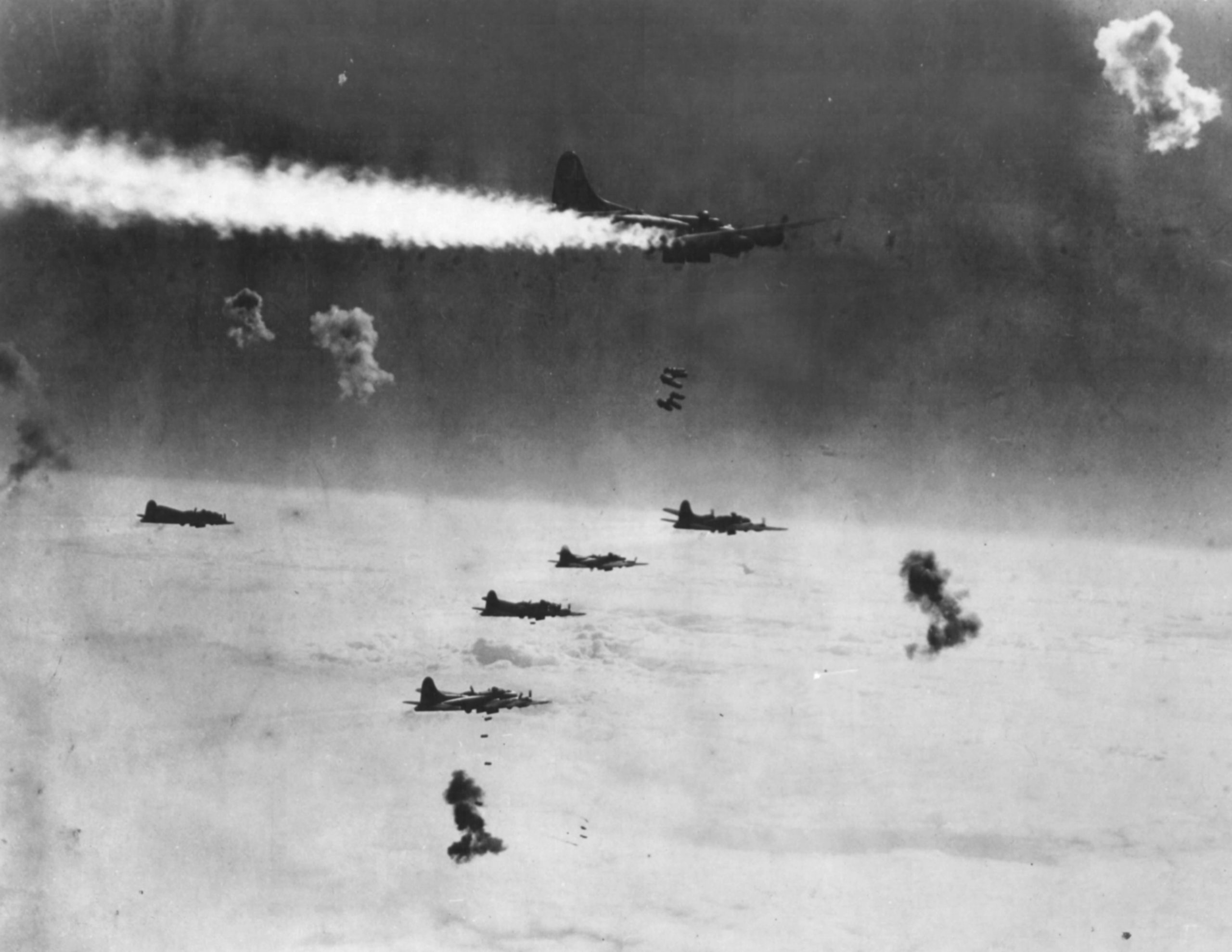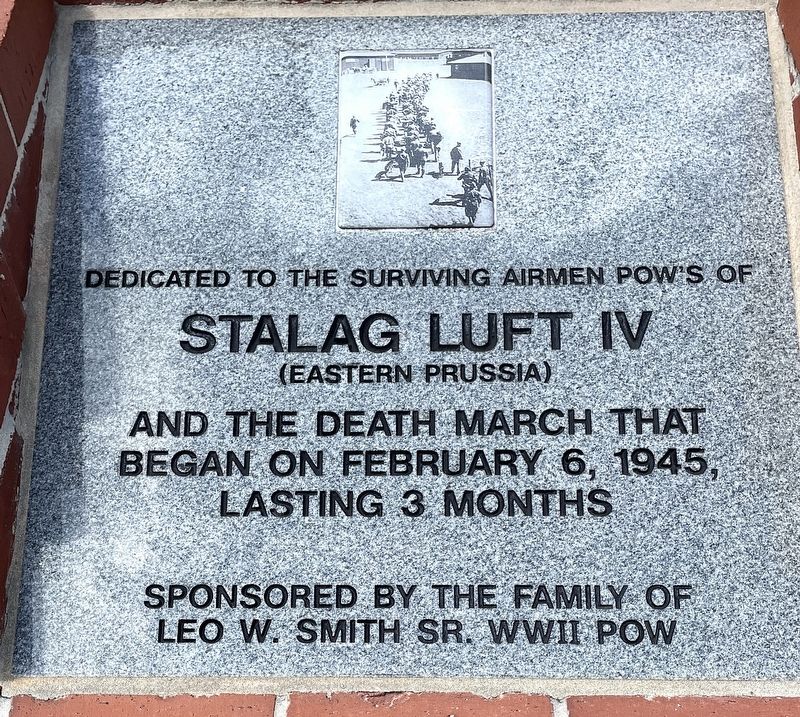
One last mission (excerpt)
Jerry Rutigliano: I was on my 27th mission when we got shot down. See, what happened, when I first got there you had to do 25 missions. Jimmy Doolittle took over in January or February of ’44, and my first mission was in February of ’44. We got halfway through, and he raised it to 30 missions, and we got shot down on our 27th. I was a POW for eleven and a half months.
Aaron Elson: Twenty-seven missions was a lot more than the average, wasn’t it?
Jerry Rutigliano: The life expectancy was less than half of that. The odds against making 25 missions are about five to one.
Aaron Elson: You were a tail gunner?
Jerry Rutigliano: I was a waist gunner. We were in the middle of the aircraft. We used to have 10-man crews, two waist gunners, then they cut it down to one waist gunner, when the fighters weren’t as thick as they used to be.
On our 27th mission we were leading the squadron over Berlin. I had six trips over Berlin. The first Berlin raid was March 6, 1944. We lost 68 bombers. That’s 680 men. We made it through that mission. We stayed down on the 7th, and went again on the 8th of March. We lost 37 more bombers.
The sixth trip over Berlin was May 19, which was 50 years ago a couple of days ago, May 19, 1944. We were leading the squadron. We turned on our IP, initial point. When you turn on the IP, you have to stay straight. The bombardier takes over, and there’s no way you can go but straight ahead. No evading flak or anything. You had the bomb bay doors open. We got two direct hits in the bomb bay. The plane caught fire.
We dropped out of formation. Our intercom was shorted out, and our alarm bell was out. Later on I found out that everybody went out in the front, the pilot, co-pilot, navigator, bombardier, and engineer. And the radio operator turned to me and said, “Help!” I could see the blaze from the bomb bay. So just before I went out, I couldn’t get the tail gunner, so I kicked the door off, and it went flying back. He saw the door, and he started crawling into the waist. The ball gunner, the guy in the lower ball, he came up. He’s in a bit of a panic seeing the plane’s on fire, and through lack of oxygen he collapsed.
I had my chute on ready to go out, and I saw him laying there. So I went back, and I and the tail gunner revived him and put oxygen on him. We smacked him, revived him, and we went out, one-two-three. The plane exploded. And a fellow that used to be in my crew was flying in another plane. He told me many years later that he told the tail gunner to keep an eye on our plane. The tail gunner told him that it exploded and nobody got out.
The pilot – I didn’t see him until 35 years later – told me the navigator’s parachute didn’t open, and he was killed.
I was captured by civilians. They beat me up. They didn’t like us. And when they got us, they said “You’re bombing the women and children.” Then I went to a local prison. The soldiers took me down there.

Aaron Elson: Where did you land?
Jerry Rutigliano: In a farm. The civilians beat the hell out of me. First of all, I was running. I hit the ground hard and I hurt my ankle. I was running away. It was a bright day. I hit this plowed-up field, and I started running away from the farmers with a dog, when up out of the wheat field pops this German with a big rifle and a big mustache. I had my hands up. And he told me to walk towards him. So I walked towards him. He searched me. He asked if I had a pistol. I said no. We weren’t allowed to carry pistols anymore because the civilians were shooting the guys with their own pistols. So by the time I’m talking to him, the civilians catch up and they start beating me. Then the soldiers came, and they took me to a prison.
Aaron Elson: When you say they started beating you, where did they hit you, in the face?
Jerry Rutigliano: In the face, the hands, swearing at me. I was a rough kid from New York. In fact, I was just 20 years old the week before. I went on my 25th mission on my 20th birthday. It would have been a big surprise for me to go home.
So I got down in this prison, and they come to take us out, and we saw a couple of other crew members. My co-pilot had a hole in his leg. He was bleeding. So they told me to pick him up, and I picked him up and carried him up this narrow stairway. One time I hit the wall with his leg and he started screaming, so they put him in the back of a truck and I told them to get him to a hospital. That’s the last I saw of him. I went to Tempelhof Airfield, on the ground. There were about 50 other GIs there who were shot down. They took us by train to Frankfurt, interrogation, solitary, threatening. We got on a train and went to Gross Tychow, which is near Danzig, up in Poland.
On the way up there we stopped. The air raid alarm sounded, we were locked in the train, and we were left there while the guards took off and went to the air raid shelter. We were in a marshaling yard in broad daylight, and they started bombing. Our own planes. Fortunately we were not hit.
Aaron Elson: What went through your mind, being on the receiving end of a bombing like that?
Jerry Rutigliano: There’s nothing you can do. You can’t scream or holler “Let me out of here!” You just have to sit there, and you hear the flak bouncing off the roof of the train.
That was one crisis. After the all-clear sounded we went up to Gross Tychow, Stalag Luft 4. They must have had over 50,000 Air Force POWs. They shot down like 4,000 airplanes.
We stayed there for nine months. And the Russians were coming from the East. They told us they were going to evacuate the camp, and we were going to march for four days, to another camp. It was February 5, 1945. So we took everything we owned, which wasn’t much. We took what food we had, the Red Cross parcels.
We started marching. We marched 86 days. Five hundred miles, in the snow, rain, sleet. We lived in barns. We slept on the ground. We lived like animals. Eighty-six days we never had our clothes off. We were lousy from head to foot, full of lice. We went through bombings, strafings. Part of that time we went on a train. There were 57 of us in this train, freight trains. We all had dysentery or diarrhea. There were no toilet facilities. Half of us had to stand up and half of us had to lay down; we couldn’t all lay down. As I said, we had dysentery and diarrhea. They wouldn’t let us out.
We got out of that, and we marched, from February 5th to April 25th. They never marched us at night, for obvious reasons, because there were about 4,000 of us in this march, all Americans. We marched to this roadblock. There were SS troops. We marched through the roadblock. We saw German soldiers on patrol. They put us in this field.
They had switched guards on us. They gave us the old Wehrmacht guards, old men, home guards, in their sixties. They told us, you’re gonna sleep here tonight on the ground, you’re gonna get up tomorrow, you’re gonna march eight kilometers, that’s around five miles, to the American lines. They didn’t want to have anything to do with the Russians. We thought they were full of baloney because we couldn’t believe anything they said.
You can imagine what we looked like, all of us 20, 21 years old. I lost 80 pounds. We ate out of the ground, raw potatoes, raw kohlrabis, turnips. It got us sick but it kept us alive. Dehydrated sugar beets, anything we could get our hands on.
When I was 15 years old I joined the 27th Tank Corps, Kingsbridge Armory in the Bronx. Two months later I turned 16. We lied. You had to be 17. We got a dollar a drill. We went after that buck a drill. And we went to Canton, New York on maneuvers, 1940, this is before World War II. So September, October, the draft took effect, and Roosevelt federalized the National Guard for one year.
I was still in high school. So I wanted to go. I was gung-ho. My father says, “If you go, I’ll tell them you’re underage.” He didn’t want me to go because he was sick. So I got out. And I enlisted in ’42. In the Air Force. But I was driving a tank in the city dumps at 15. I didn’t have a driver’s license, I never drove a car. Where was I?
Aaron Elson: You were being marched back toward the American lines.

Jerry Rutigliano: We were bedded down, and they said you’re gonna march to the American lines tomorrow morning. We got up, we started marching, and sure enough, we saw an American jeep, a GI, and a rifle, First Army, 104th Infantry, the Timberwolves. We naturally went nuts. There was a major there who shook hands with everybody. So we marched across the Elbe River, and we were liberated. We had K rations. Which to us was like a steak dinner. We went back for seconds on K rations. The rest was all history. We finally got a shower, a bath, clothes.
Aaron Elson: What happened to your guards?
Jerry Rutigliano: They became POWs. They weren’t the bad ones, the old men, like I am now, 70 years old. We had some bastards in there, but that’s something else.
Aaron Elson: Did you have nightmares after the war?
Jerry Rutigliano: Oh, yes, for a long time. I was in a barrack and they awaken us, at one or two o’clock in the morning. They say you’re going on another mission, last mission, and we get in the plane, and we always crash. We never make that mission. I used to dream about this all the time. In the beginning, I dreamt of it constantly. In fact I used to wake up screaming sometimes. My wife says last night I kicked her, screaming.
Here’s a crucifix my mother gave me. I carried it on every mission. I never left the ground without it. And this part that’s holding it together is from an old Klim can, that’s milk backwards. When the Germans caught me, they examined this. They thought it was something to do with spying.
When we were liberated I weighed about 115 pounds, from 185. Here’s a picture taken a couple of days later, after we got a change of clothes That’s at Hermann Goering’s airfield. And this is Jimmy Doolittle. That’s me and General Doolittle in Washington, D.C.
Aaron Elson: Did you ever forgive him for…
Jerry Rutigliano: That’s exactly why he sat me down. That’s exactly what happened. This was in 1976 at an 8th Air Force reunion in Washington, D.C. I went to see him. There were a whole bunch of people to see him. I said, “General, do you remember when you raised the missions from 25 to 30?”
He said “Yes.” He was a little bit of a man.
I said “I got shot down on my 27th. And I was a POW because of you.” I was joking, really.
He said, “Sit down.” He put his hand on my shoulder. There’s dozens of people waiting to see him, and he’s explaining to me why he had to raise the missions. He’s a general. I became a little bit embarrassed. Here’s a guy that took off from an aircraft carrier with no hopes of getting back for that Tokyo mission. He was a great, great, great general, a great soldier. I admired him, and I told him that. I didn’t want him to have a guilty conscience.
He said we needed experienced crews. He was apologizing. And he wouldn’t let me go, I wanted to leave because it was getting embarrassing, people wanted to see him, and he kept talking to me. He just died recently.
